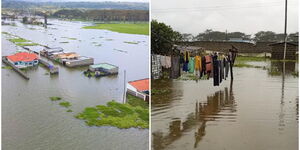Food And Agriculture Organization (FAO) representative to Kenya Tobias Takavarasha has warned of a second generation of desert locusts that could ravage East African countries including Kenya even as the country grapples with effects of the first wave.
The second generation of locusts is reportedly expected to the 20 times bigger than the first, a mind-blowing figure considering the first generation consisted of billions of desert locusts.
"The first generation of locusts is now breeding, they've laid their eggs, they will be hatching into nymph and hoppers, so this is the time to harness or control them before they start flying or before they start to affect the coming planting season," Takavarasha explained to Thomson Reuters Foundation News.
According to FAO, optimum breeding conditions are temperatures of around 19 to 25 degrees Celsius, with locust eggs taking around two weeks to hatch.
A section of experts maintains that climate change could have played a part in the desert locusts invasion, with the locusts which originated in the Middle East finding perfect breeding conditions in countries including Kenya, Somalia and Ethiopia due to rising temperatures.
Agriculture Cabinet Secretary Peter Munya in the past month has dismissed calls by a section of Kenyans to declare the locust invasion a national disaster, reiterating that the government had the situation under control.
According to Munya, the second phase of measures meant to combat the locusts will see the swarms contained by June 2020 although eradication is expected to take longer.
“We have not yet reached the stage of declaring a national disaster. This is an extreme measure usually taken to attract funding to deal with a particular problem and we already have this funding.
“The government has also mobilised its own resources and we will deploy more as we acquire them," he stated.
Among partners supporting the government to deal with the invasion are the African Development Bank (AfDB), World Bank, European Union and the United States.
20 planes have so far been deployed to spray pesticides in various counties affected by the locusts.
Munya additionally addressed warnings from the Strategic Food Reserve that the locusts' effect on farms threatened the country's food security.
He insisted that if the need arose, the country would import to offset the deficit.
Watch Food And Agriculture Organization (FAO) representative to Kenya Tobias Takavarasha in the video below:












